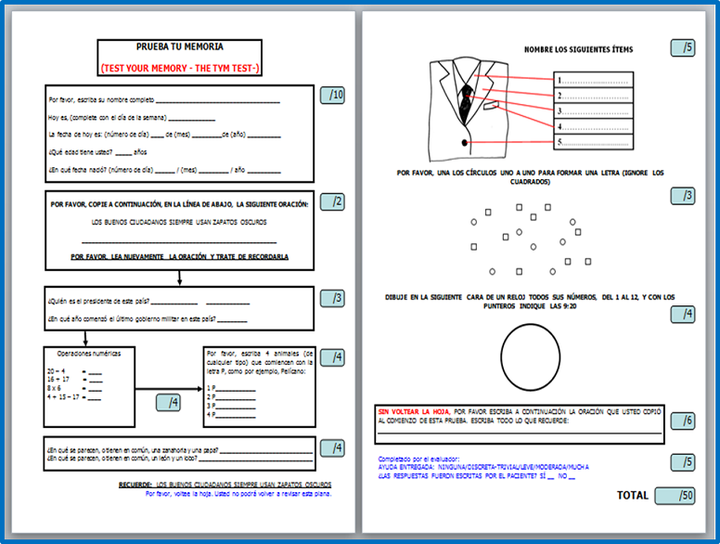Test Your Memory-Spanish version (TYM-S), a validation study of a self-administered cognitive screening test

Abstract
OBJECTIVES - To develop the Test Your Memory (TYM)-Spanish version (TYM-S), a self-administered cognitive screening test, in a Chilean older sample and to estimate its psychometric properties and diagnostic accuracy. METHODS - The TYM was translated into Spanish and adapted for a Chilean population to develop the TYM-S. Measures of global cognitive impairment and executive dysfunction were administered to 30 controls, 30 dementia patients, and 14 subjects with mild cognitive impairment (MCI). All participants' proxies were interviewed with assessments of dementia severity, functionality in daily living activities, and cognitive change. Convergent validity and internal consistency reliability of the TYM-S were estimated. Cut-off points, sensitivity, and specificity were determined to test its diagnostic capacity for dementia or MCI. RESULTS - Regarding convergent validity, the TYM-S was significantly correlated (p < 0.001) with global cognitive impairment (Mini-Mental State Examination r = 0.902; Addenbrooke’s Cognitive Examination-Revised-Chilean version r = 0.922; Montreal Cognitive Assessment r = 0.923), executive dysfunction (Frontal Assessment Battery r = 0.862), dementia severity (Clinical Dementia Rating r = -0.757), functional capacity (Technology-Activities of Daily Living Questionnaire r = -0.864; Pfeffer Functional Activities Questionnaire r = -0.748; Instrumental Activities of Daily Living r = 0.769), and cognitive change (Alzheimer’s Disease 8-Chilean version r = -0.700) measures. Regarding reliability, Cronbach’s alpha was 0.776. Optimum cut-off scores of 39 and 44 distinguished dementia cases from controls (93.1% sensitivity, 82.2% specificity) and MCI cases from controls (85.7% sensitivity, 69% specificity), respectively. The extent of assistance required in the TYM-S and cognitive impairment was correlated. CONCLUSIONS - The TYM-S is a valid and reliable instrument to assess cognitive impairment, showing good psychometric properties and diagnostic capacity to identify cases of dementia in a Spanish-speaking older cohort. Although its need for assistance may be limiting, its ability to quickly assess several cognitive domains supports widespread clinical use.
